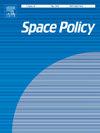Project and knowledge management at European public space agencies: The need for a three-dimensional project management office
IF 2
4区 社会学
Q2 INTERNATIONAL RELATIONS
引用次数: 0
Abstract
Space agencies are continuously developing new space missions, each of which undergoes a long development cycle, from the feasibility study to routine operations and disposal, as per the European Cooperation for Space Standardization (ECSS), the body responsible for developing and maintaining a set of standards for the space industry in Europe. Each mission is a stand-alone project, where the development cycle starts every time from scratch, with new resources, technologies, and requirements, applying the same (tailored) standards, but with limited usage of lessons learnt from earlier or parallel projects. In this article, we analyse typical project management and knowledge management approaches adopted by public space agencies, making use of a relevant case study in Europe. From the results of our case study analysis, we propose a three-dimensional Project Management Office (PMO) governance, explaining how this novel approach helps address limitations and challenges of the current approaches when dealing with multiple complex projects, such as space missions. With the PMO defined as an organisational body or entity assigned various responsibilities, the authors focus on three specific areas, namely, Strategy, Resources, and Knowledge, as three key drivers that can improve the current management of projects of the organization.
欧洲公共空间机构的项目和知识管理:对三维项目管理办公室的需求
根据欧洲空间标准化合作组织(ECSS)的说法,各空间机构正在不断发展新的空间任务,从可行性研究到日常操作和处置,每项任务都经历了一个漫长的发展周期。欧洲空间标准化合作组织负责制定和维护欧洲空间工业的一套标准。每个任务都是一个独立的项目,其中开发周期每次都从零开始,使用新的资源、技术和需求,应用相同的(定制的)标准,但是从早期或并行项目中吸取的经验教训使用有限。在本文中,我们分析了公共空间机构采用的典型项目管理和知识管理方法,并利用了欧洲的一个相关案例研究。根据我们的案例研究分析结果,我们提出了一个三维项目管理办公室(PMO)治理,解释了这种新方法如何帮助解决当前方法在处理多个复杂项目(如太空任务)时的局限性和挑战。将PMO定义为分配了各种职责的组织机构或实体,作者将重点放在三个特定领域,即战略、资源和知识,作为可以改进组织项目当前管理的三个关键驱动因素。
本文章由计算机程序翻译,如有差异,请以英文原文为准。
求助全文
约1分钟内获得全文
求助全文
来源期刊

Space Policy
Multiple-
CiteScore
3.40
自引率
36.40%
发文量
40
期刊介绍:
Space Policy is an international, interdisciplinary journal which draws on the fields of international relations, economics, history, aerospace studies, security studies, development studies, political science and ethics to provide discussion and analysis of space activities in their political, economic, industrial, legal, cultural and social contexts. Alongside full-length papers, which are subject to a double-blind peer review system, the journal publishes opinion pieces, case studies and short reports and, in so doing, it aims to provide a forum for the exchange of ideas and opinions and a means by which authors can alert policy makers and international organizations to their views. Space Policy is also a journal of record, reproducing, in whole or part, official documents such as treaties, space agency plans or government reports relevant to the space community. Views expressed in the journal are not necessarily those of the editors or members of the editorial board.
 求助内容:
求助内容: 应助结果提醒方式:
应助结果提醒方式:


